Blog
5 Takeaways from INMA Media Innovation Conference
This week 300 news executives gathered in Copenhagen for the INMA Media Innovation Conference. Held in the historic printing facility of JP/Politikens, this event has been a refreshing in-person celebration of our industry and it felt like a long due family gathering.
From the many insightful speeches, cases and individual conversations, we have synthesised our key take aways from the conference.
Publishers are looking to grow their advertising revenues, next to the ongoing focus on subscription revenues
Over the past years there has been a lot of focus on subscriptions strategies but growth is expected to slow down, partially also linked to news fatigue. A recurring theme at the Summit was a renewed focus on growing advertising revenues while still focusing on subscription growth. Both Mark Challinor and Greg Piechota highlighted in their speeches that subscriptions and advertising are not mutually exclusive.
“The next big thing in reader revenue is … advertising” – Greg Piechota
A solid and integrated data strategy is a needed to support such growth alongside new ad platforms that have to be created as the 3rd party cookie apocalypse unfolds.
While for many years the digital advertising proposition seemed not no longer be working, newer models like the ones used by TikTok and Instagram, which are based on rich data gathering and personalisation algorithms, are better tolerated by digital users. There is still a long way to go before finding a good solution for non intrusive ads seamlessly integrated in the digital reading experiences, but premium advertising is more and more present again in publishers strategies. One can wonder whether this renewed focus is driven by the lack of sufficient subscription based revenues or by an increasing demand from advertisers to access the audiences of the publishers with their offerings in an impactful way. That question was not really answered in public.
Data is at the core of publishers’ digital growth strategies, but remains challenging to put in practice
Several speakers touched on the importance of data for digital growth. Pål Nedregotten brought new insights into the impressive achievements at Amedia. With a 60% digital subscriber base and having seen revenues grow from NOK 53M to 62M in the past years, Pål links Amedia’s success to their Smart Data Strategy which is integrated across all parts of the business from subscriptions to advertising and editorial.
The deanonmisation of readers by encouraging them to log in and create an account is key. This allows Amedia to get to know their readers in depth. No less than 130 data points are collected for each readers to serve as base for
- Newsroom and editorial analytics to identify best performing stories for conversion & retention
- Insights into customer journey and friction points
- Proving readers that Amedia understands them best to offering the most relevant advertising
Collaboration in some markets against the power of BigTech companies
The controversial relationship between news publishers and big tech giants is no secret. In one of the first lectures, Dorthe Bjerregard Knudsen , COO at JP/Politiken, shared how Danish publishers are seizing the opportunity to gain back control with the institution of the DPCMO (Danish Press Publications’ Collective Management Organisation) and the reception from the Danish government of the European Digital Market directive.
The fight is playing out on 3 fronts:
- The fight for Content: Out of 700 billion times JP/Politiken content has been shown for free in Google searches only 43 billion led to a visit to one of their website. This is mainly due to features like Google Spotlight that display a large extract of content as preview in the search results. Danish media are fighting to have more legal protection against such use of their content
- The fight for Data: As we approach the end of third-party cookies, publishers must ensure a future where 1st party data is the norm. The risk is that big tech giants could maintain control of data by establishing control of the context in which data is captured.
- The fight for Advertising Revenue: The share of Facebook’s and Google’s Advertising Revenue in Denmark is projected to reach 67% by 2025 (a jump from 25% in 2015). This is only possible because of the huge amount of data these platforms collect that allows for better targeting. While banning targeting altogether is not seen as a solution, introducing a ban on third-party targeting might yield positive results and would give more transparency to users on who is collecting their data.
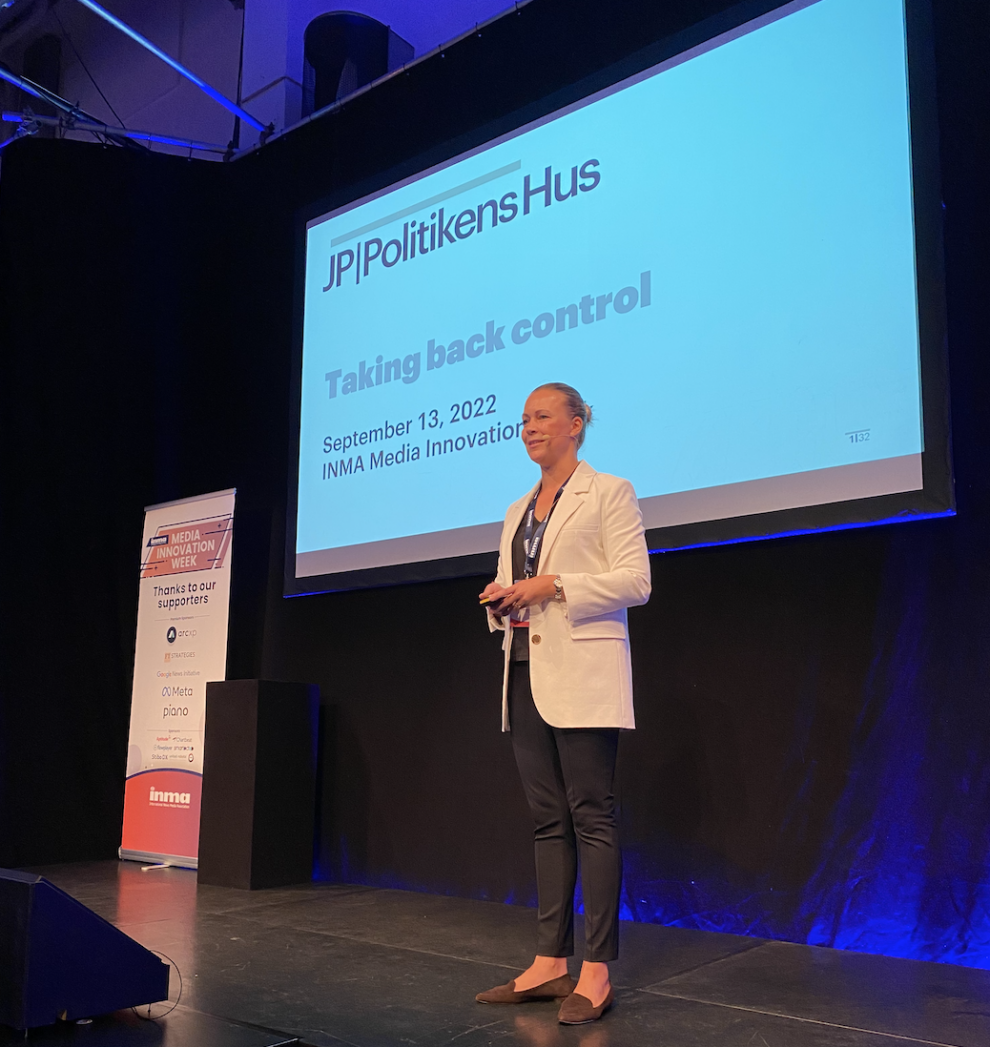
Remote learning and sharing of best practices on the rise, as a side effect of the pandemic
Earl Wilkinson, CEO of INMA, shared with the audience in his unique way his key learnings of evolving the association throughout the pandemic. As a result of the pandemic, INMA had decided early on to cancel all in-person events and move to virtual sessions. Specifically, the webinars have been proven to be very popular and attracted a whole new group of interested attendees with the publisher’s organizations. As a result, the INMA Member Base has grown to over 20.000 members, a historical milestone.
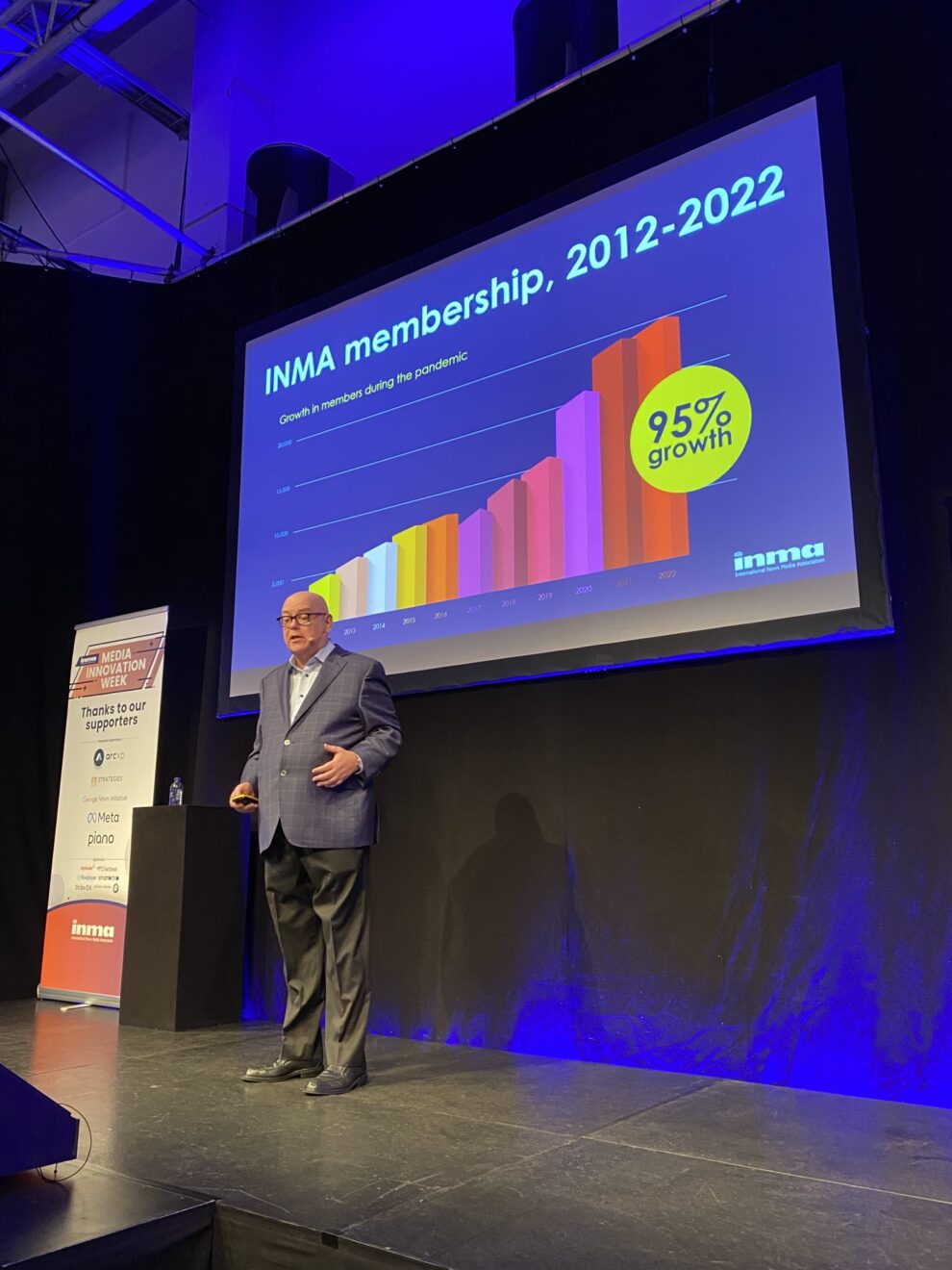
Given the success of the Webinars, INMA will continue to follow a double track by organizing in-person events next to virtual and remote learning sessions.
The news industry expects a lot from Metaverse and AI but still lacks understanding
The world around us is ever changing, and news media publishers must be prepared for this, both for better and for worse. Sofie Hvitved of the Copenhagen Institute for Futures Studies took us through a journey focusing on 8 key trends to watch out for including the creator economy, web3, Metaverse, and AI content outsourcing.
Biggest risk is not competition but becoming irrelevant because the world changes – Adam Mosseri
If publishers will want to interact with customers in the future it is likely they will have to have a presence in the Metaverse. Learning to adapt pre-emptively to this could allow proactive businesses to take advantage of an emerging space while others catch up. As the Metaverse takes hold, algorithms and audiences will eventually develop a preference for Metaverse-first content. New audience expectations including direct-to-avatar (paralleltommyhilfiger.com) show this already taking shape. How newsroom content will transform to adapt specifically to be consumed within the Metaverse remains to be seen.
A poll ran live with the 300 publishers present at the event shows the audience has high expectation from Metaverse and AI. However there is a lack of understanding of what some of these technologies mean or how they can help publishers prepare for the future. 34% of the audience admits they don’t understand what metaverse is and how it can impact our industry.
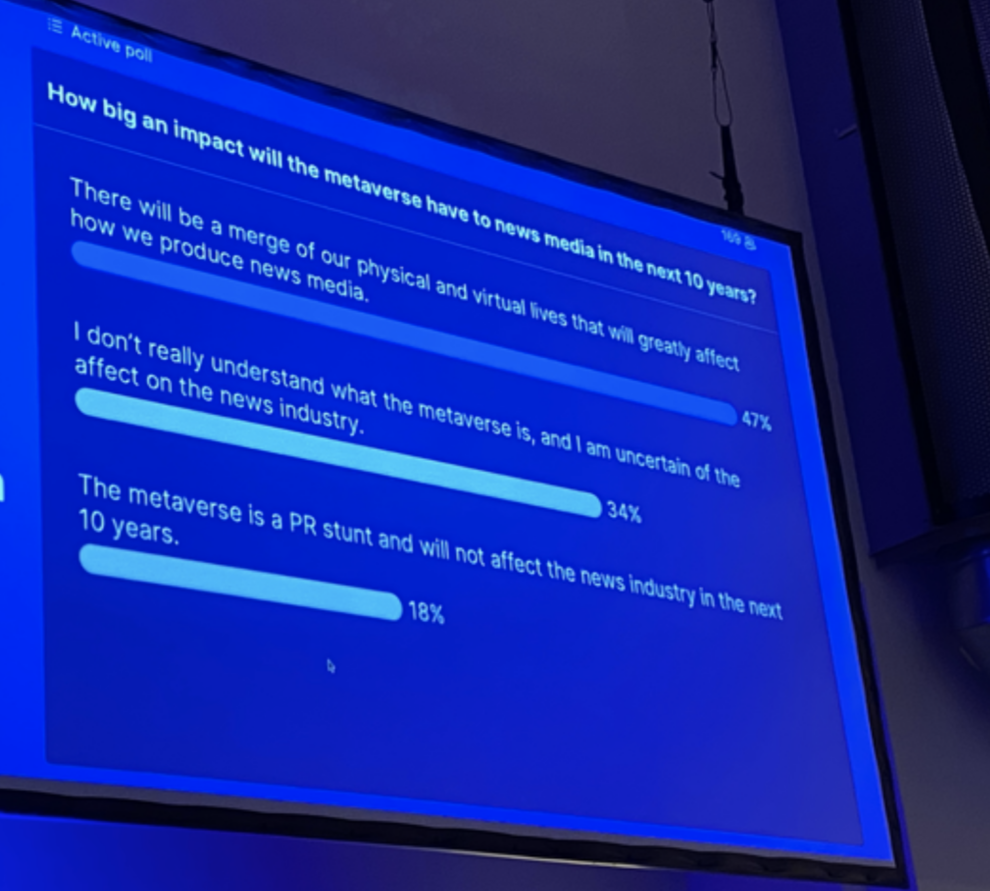
The growth of AI generated content in recent years has changed the way content is created. With virtual influencers (e.g. Sidus Studio X’s “Rozy”) gaining momentum in a way not seen before, the opportunity for AI driven content is here. For the news industry, advances in AI driven journalism and tools used to aid content creators (e.g. QuillBot) are something noteworthy for all publishers. Futurists expect most of content online could be AI generated by 2030.
It’s no surprise that an overwhelming 93% of the audience at the INMA Conference expects AI to have a much more active role in the newsrooms as well.
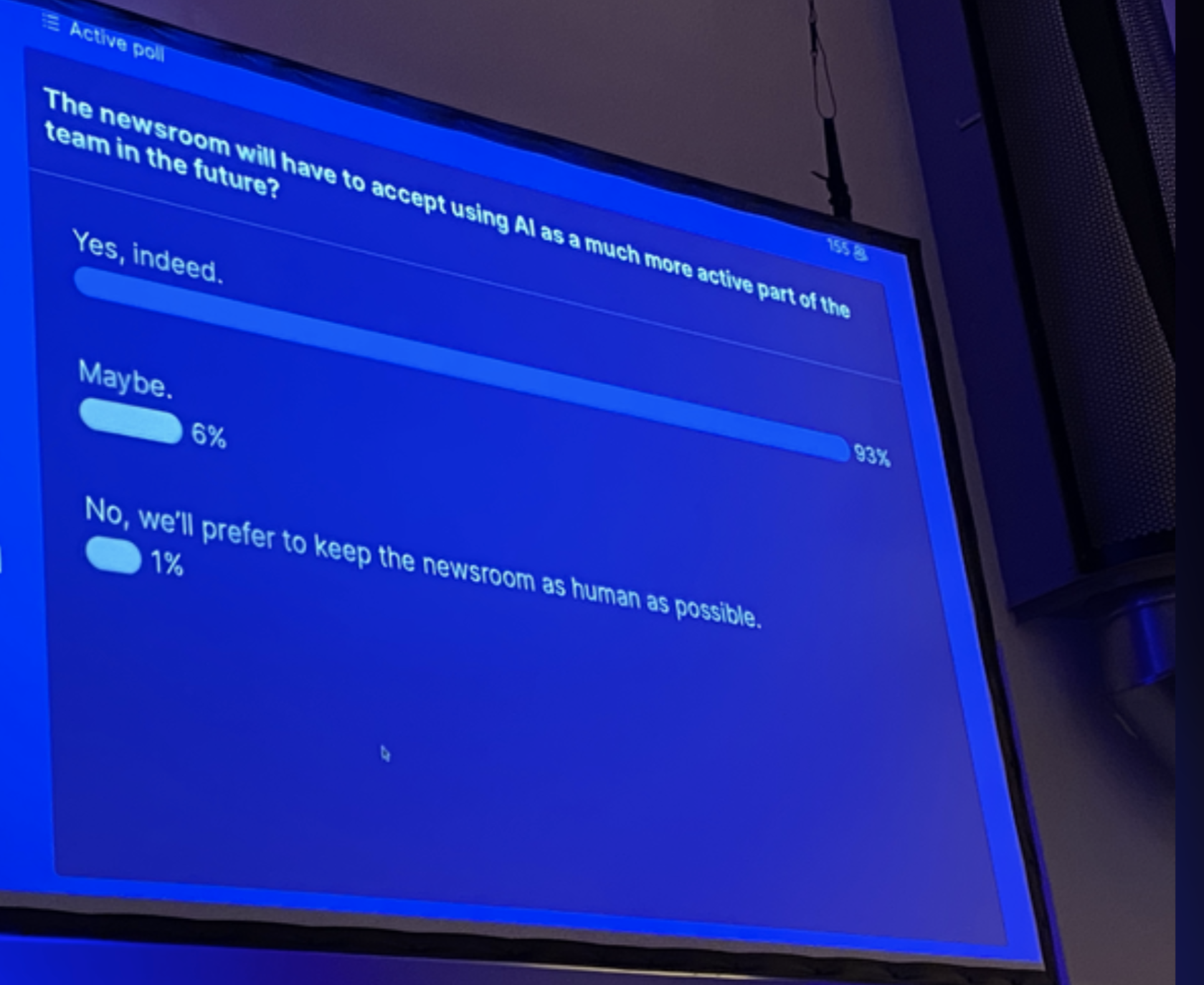
At the Digital Growth Summit in London on October 19th we will host a few hands on session where we aim to unpack some of these concepts in a practical version. We are also thrilled to have Sofie joining our line-up of speakers for the Summit. If you haven’t booked your ticket yet you can do so here.
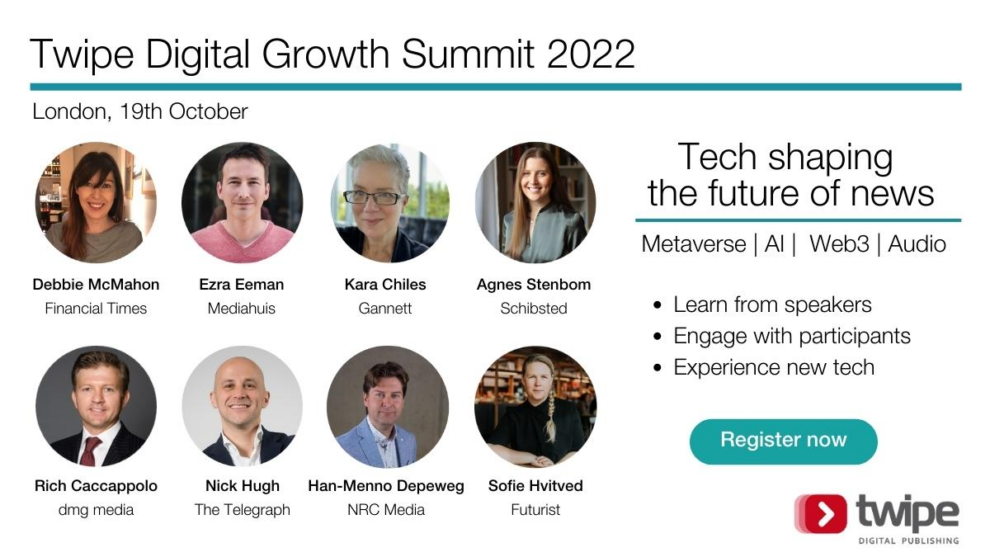
Other Blog Posts

Stay on top of the game
Subscribe to Twipe’s weekly newsletter to receive industry insights, case studies, and event invitations.
"(Required)" indicates required fields
